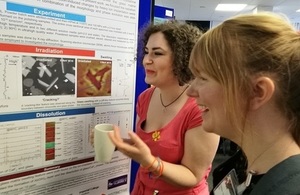Investing in technical expertise for the future of nuclear decommissioning
Academic research is vital for addressing uniquely complex challenges.

PhD students reviewing work
Challenge
To maintain and develop sufficient high-level expertise to support decommissioning as the mission moves forward over the next 100-plus years. To access this capability to underpin NDA’s technical strategy options and encourage innovation.
Solution
Invest in a range of university research programmes targeted at decommissioning and the fundamental supporting areas whilst supporting wider collaborative research programmes that align with industry requirements.
| Benefits | Raise awareness in the academic community of the industry’s research needs, encourage highly qualified decommissioning scientists into the sector, foster innovative technology and influence NDA’s strategic direction |
| Status | Ongoing |
| R&D driver | Delivering innovation |
| Research organisations | Various universities |
See NDA University Research and Development Strategy
Details
Academic research is vital for understanding and addressing the uniquely complex challenges on the NDA’s 17 nuclear sites. Support for postgraduate-level university research therefore plays an important role in maintaining the high-level skills needed for current decommissioning work, as well as fostering the expertise needed for a mission that will continue for at least another 100 years.
Where specific on-site problems are identified during decommissioning work, Site Licence Companies (SLCs) and suppliers are responsible for funding any university studies that may be required.
As a strategic body, however, the NDA’s focus is broader, looking at the overall UK picture to encourage academic research programmes that are relevant across a number of its sites or influence the strategic direction of future decommissioning work.
These university programmes often complement SLC research but also explore more conceptual, earlier-stage ideas that could not be funded as part of delivering more focussed site plans.
University-related investment is allocated as part of the NDA’s annual £5 million of direct Research and Development spending, accounting for almost one-third of the total. NDA’s university interactions are managed through a contract with the National Nuclear Laboratory. The investment also supports developing vital technical expertise for the future.
Studies are funded directly through PhD bursaries which align with NDA strategic themes but also collaboratively with other university funding bodies, such as research councils and industry, who are able to influence studies that are relevant for real industry needs. This leverages significant additional funding. As well as decommissioning, other nuclear sectors are also covered by collaborative programmes, and the learning is shared widely.
The recently launched TRANSCEND, for example, involves 11 universities plus a range of public and private-sector organisations who provide funds and/or industrial supervision. The core £4.6 million funds were provided by the Energy and Physical Sciences Research Council, and contributions from collaborating organisations, including NDA, took the total up to more than £9 million, supporting 40 projects over a 4-year period.
In addition, the NDA supports more than 50 PhDs across 20-plus universities in the UK that are focussed on industry needs.
Other investments are targeted at publicly funded initiatives that have a broad scientific remit and may provide future value and skills for the NDA mission, such as the Research Centre for Non-Destructive Evaluation (RCNDE), the Nuclear Advanced Manufacturing Research Centre and the Next Generation Nuclear Centre for Doctoral Training.
Recommendations on future priorities and co-ordination across the UK are provided through the NDA-sponsored Nuclear Waste and Decommissioning Research Forum, which promotes understanding and collaboration across the UK for nuclear decommissioning.